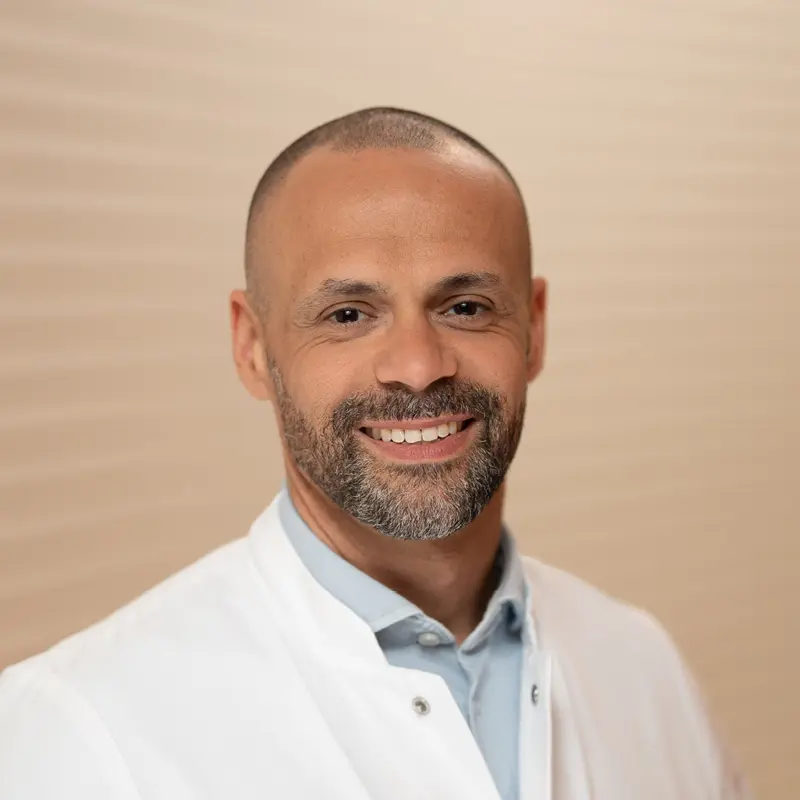
Spinal surgery
TUMOUR OF THE SPINE – DIAGNOSIS AND TREATMENT
The diagnosis “tumour on the spine” is one of the worst clinical pictures imaginable for most people. Numerous other questions quickly follow: Is the tumour on the spine benign or malignant? How badly is the spine affected? What treatment options are available? And the idea of an operation on the spine often causes great fear to creep into the client’s mind.
The bad news first: whether it is a benign tumour or a malignant tumour, in the vast majority of cases it has to be surgically removed. But now the good news: our spinal surgery specialists will gently and sensitively allay your fears and answer all your questions in detail. Because at the ETHIANUM Heidelberg, a dedicated, interdisciplinary team will accompany you from diagnosis to possible surgery, including aftercare, when it comes to spinal tumours. All surgical techniques and methods for the treatment of tumours are also performed using the latest minimally invasive methods in spinal surgery.
Find out what types of tumours there are and what treatment methods the ETHIANUM Clinic Heidelberg offers you.
Intradural tumours of the spinal cord and cauda equina
An intradural tumour is a tumour that can develop in the area of the spinal cord and cauda equina. Intradural pathologies (tumours) can be inconspicuous for a long time and suddenly trigger serious neurological deficits and pain. Thorough clarification, interdisciplinary discussion of findings and precise individualised treatment planning are of great importance for patients. Safe treatment through the use of nerve measurement methods (neuromonitoring) is of great importance and is routinely used by the spinal surgery team.
Intradural tumours include above all
- Neurinomas
- menigeomas
- ependynomas
- gliomas
- Malignant peripheral nerve sheath tumours (NPNS)
Benign tumours of the spine
Benign tumours of the spine usually grow slowly. They are often an incidental finding. However, a benign tumour also takes up space or possibly destroys structures. A corresponding symptomatology appears. Surgery should therefore be sought for the spinal tumour.
- Pain in the periosteum
- Localised pressure or knocking pain
- Pain at rest without exertion
- Continuous pain
- Painful restriction of movement of the spine
- Neurological disorders through to bladder and rectal dysfunction
- Instability of the spine
Benign tumours of the spine include
- Bone tumours: osteoid osteoma, osteoblastoma
- Cartilaginous tumours: chondroma, osteochondroma, chondroblastoma
- Tumours caused by vascular growths: Haemangioma, haemangiopericytoma
- Others: Giant cell tumour
- Tumour-like bone changes: aneurysmal bone cyst, eosinophilic granuloma
Make an appointment
If you would like to find out more about the possibilities of spinal treatment, you can make an appointment with our specialist using our contact form – or you can call us directly on +49 6221 8723-440.
Malignant tumours of the spine
If a tumour is diagnosed as malignant, doctors from all disciplines involved discuss the next steps in a tumour conference. Together, they find the optimal and individualised treatment strategy for the client.
In addition to the symptoms caused by the growth of a malignant tumour, additional symptoms may occur:
- Fever
- Enlargement of lymph nodes
- weight loss
- night sweats
- fatigue
Malignant tumours of the spine include
- Bone tumours: osteosarcoma
- Cartilage-like tumours: chondrosarcoma, chondromyxoid sarcoma
- Tumours of the connective tissue: fibrosarcoma
- Tumours of the bone marrow (haematopoietic): Plasmacytoma (multiple myeloma, Kahler’s disease) Ewing’s sarcoma, non-Hodgkin’s lymphoma
- Others: Giant cell tumour (osteoclastoma, brown tumour), chordoma
Diagnosis of benign and malignant tumours of the spine
The main procedures for diagnosing benign and malignant tumours of the spine include
- Interviewing the client
- Neurological examinations
- Ultrasound
- Computed tomography (CT)
- Magnetic resonance imaging (MRI)
- Nuclear medicine examination procedures
- Myelography
- angiography
- Biopsy (removal of a tissue sample)
- Laboratory diagnostics
The internationally standardised grading system (TNM) then ensures a consistent classification of the tumour according to size, lymph node involvement and possible metastases. This classification is the basis for an optimally successful treatment strategy.
Surgical treatment of spinal tumours
The spinal cord and spinal nerves are highly sensitive areas of the spinal column. The removal of a tumour in these areas is correspondingly challenging. The tumour may be in an unfavourable position or only partially removed and thus reduced in size. There are limits to the interventions here. However, even in these cases, spinal surgery can significantly improve the client’s quality of life.
Spondylodesis is a stabilising surgical technique that counteracts instability of the spine and possible signs of paralysis. A spinal fixation system consisting of pedicle screws and rods supports the spine. Regular follow-up checks ensure the client’s stability and healing success. Rapid intervention is possible in the event of renewed tumour growth. Our interdisciplinary team at the ETHIANUM Heidelberg is committed to supporting you from diagnosis to aftercare.
OUR DOCTORS
Specialist in spinal surgery

BERK ORAKCIOGLU
–
Specialist in spinal surgery
Priv.-Doz. Dr Berk Orakcioglu is a specialist in spinal surgery. The neurosurgeon performs highly demanding operations with a high degree of safety and precision. His interpersonal understanding in particular characterises his dealings with his clients.

JASON PERRIN
–
Specialist in neurosurgery and spinal surgery
Dr. Jason Perrin is a scientifically minded neurosurgeon who decided early on to specialise in spinal surgery, and he now covers the entire spectrum. He treats both conservatively and surgically, from congenital and degenerative malformations to the consequences of accidents and tumour diseases of the spine.
